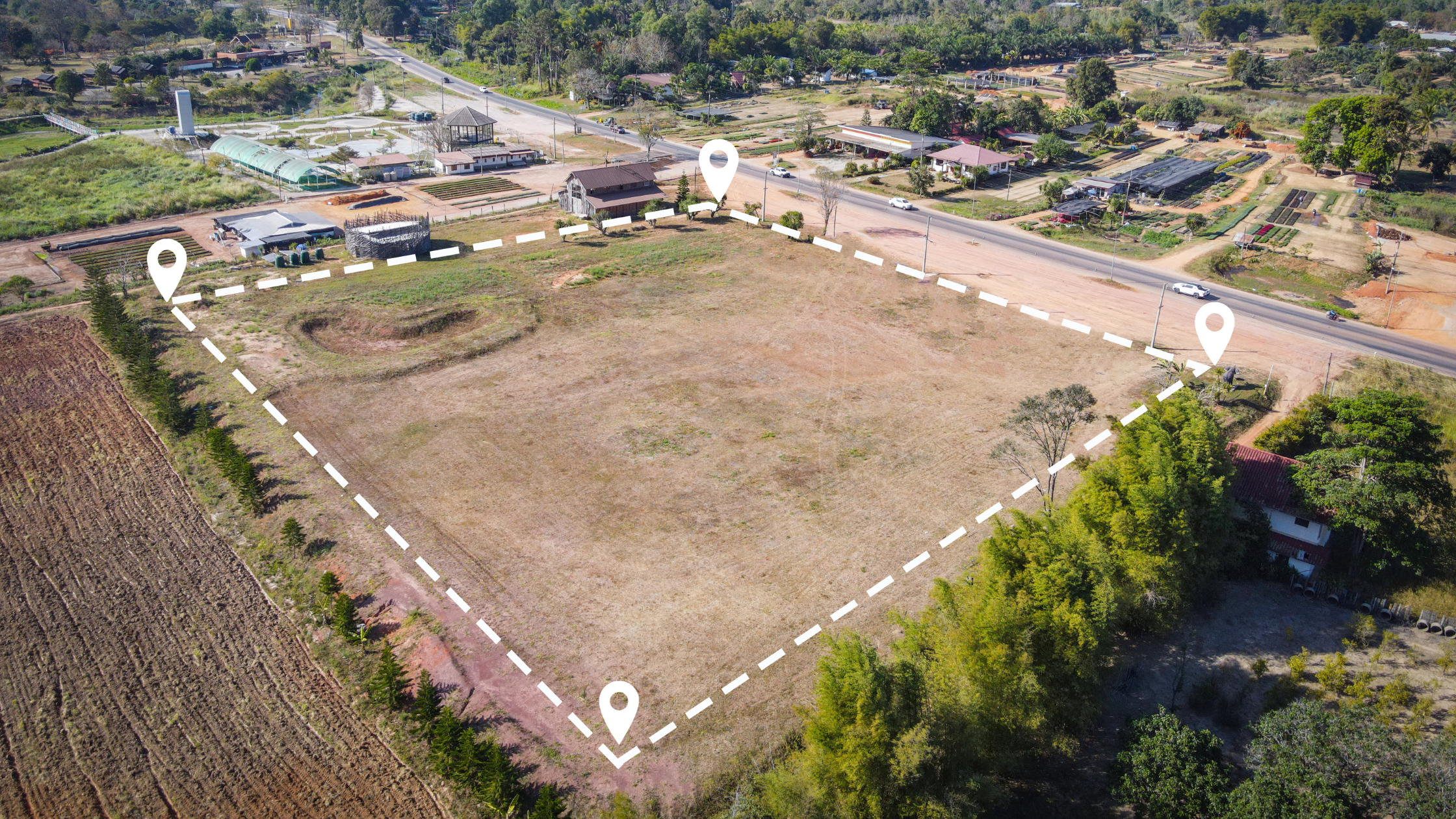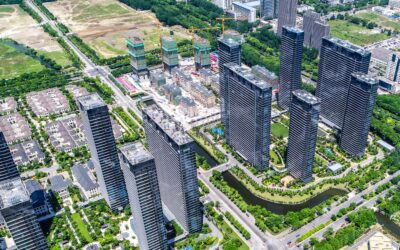As a new CRE investor, you’re likely to be familiar with the usual types of CRE investments — multifamily, office, retail, and industrial.
But have you considered diversifying your portfolio by investing in commercial land?
This alternative Commercial Real Estate investment can help you build wealth and add variety to your real estate holdings. Commercial land offers several unique benefits that set it apart from other types of CRE investments.
For starters, it can yield a high rental income despite having virtual maintenance costs, not to mention the possibility of significant capital appreciation over time.
In this blog, we’ll walk through the advantages and potential risks of investing in commercial land, and how it stacks up against other types of CRE investments.
What is commercial land?
Commercial land is land that is specifically zoned and designated for commercial use, not for homes (residential) or farming (agricultural). It’s any land where businesses can operate, whether it’s a store, office, factory, or warehouse.
Types of commercial land investments
1. Retail Land
Retail land is positioned in high-footfall areas and is ideal for developing shopping centers or retail outlets. While this type of CRE offers excellent return potential, keep in mind that consumer trends — particularly the shift to e-commerce — can impact its value.
2. Industrial land
Industrial land caters to the needs of factories, warehouses, or logistics centers. Demand for storage and distribution spaces has risen with the surge in online shopping, although this comes with potentially higher maintenance and strict zoning.
3. Office space land
Office space land is meant to be developed into office buildings and may offer lucrative leasing opportunities. However, the trend towards remote work could weaken demand.
4. Mixed-use land
Mixed-use land is a blend of commercial and residential, allowing for varied income sources. Note that mixed-use development often requires navigating complex zoning regulations and approval processes.
You can also convert agricultural land for commercial use. However, you’ll likely have to deal with strict land use laws and potential environmental restrictions, which can make the conversion complicated and costly.
Why is commercial land expensive?
The simple answer is supply and demand. There’s a finite amount of land available for commercial use, and that scarcity makes it valuable.
Benefits of investing in commercial land
- Commercial land presents a strong opportunity for substantial long-term returns, especially if you buy at the right time and in the right location. The inherent scarcity of land can drive up its value considerably and make it a highly sought-after resource for developers looking to expand.
- Land typically carries lower maintenance expenses. Unlike developed properties (like office buildings or retail spaces), vacant land doesn’t require much upkeep — there are no buildings to repair, no landscaping to maintain, etc. Your strategy could be as simple as buying, holding, and eventually selling the land to a developer at a profit, making it a relatively hands-off investment. However, there might still be some costs associated with land ownership, such as property taxes, insurance, and possibly fencing or basic upkeep to prevent trespassing.
- You can generate a consistent cash flow by leasing out the land for commercial use if you want to create a regular income stream.
- Including commercial land in your CRE portfolio lets you diversify your investments, which helps mitigate risks associated with market fluctuations and reduces your overall exposure.
- The value of commercial land typically increases with inflation, making it a solid protection against rising costs. This also applies to any rental income derived from the property.
- Commercial land can serve as collateral for loans. You can use it as leverage to finance additional investments or develop the property when the time is right.
- In many regions, owning commercial land can provide tax advantages such as deductions for property taxes or depreciation on any improvements made to the land.
- Compared to more volatile investments like stocks or bonds, commercial land tends to be less affected by daily market swings, so it offers more stability as a long-term investment.
Understanding the Risks of Commercial Real Estate (CRE) Loans
- Investing in commercial land requires a significant upfront investment that is often much higher than what residential or smaller commercial properties require.
- The value of commercial land can fluctuate based on broader economic conditions and interest rates, which could affect your investment during economic downturns.
- Unlike stocks or bonds, commercial land is not as quickly convertible into cash. Selling can be a lengthy process that potentially takes years.
- Zoning regulations and other laws can limit how you use the land, affecting potential returns and development possibilities.
- Even if your land is undeveloped, you’ll still need to pay property taxes and comply with regulations, the costs for which can add up.
- Environmental and legal risks such as contamination, flood risks, and stringent environmental laws can decrease your land’s value and lead to higher compliance costs.
- Rising interest rates can increase borrowing costs and dampen demand for commercial land, therefore negatively affecting its value.
- Undeveloped land might not produce income until it is sold or developed. This can create gaps in your cash flow.
- Land in less developed or remote areas may appreciate slower and be harder to sell.
Tips for successful commercial land investment
Choose land that is located in the path of development, particularly in urban or up-and-coming areas. Look for parcels along the path of a city’s expansion.
This strategic position can increase the land’s value substantially and offer you a chance to profit in the near future.
If you prefer a more hands-off investment, consider vacant commercial land. It requires minimal upkeep as there are no utilities to manage.
The financial demands are generally limited to taxes and possibly minimal fees, so you don’t have to deal with the ongoing costs typical of other property types.
Secure financing early, especially if you have never tried applying for a CRE loan before. Start exploring financing options well in advance of your purchase.
Compare offers from various banks and lenders. If you’re looking for a direct CRE loan lender, don’t hesitate to reach out to us here at Private Capital Investors.
Make sure that the land is zoned for your intended use before investing to avoid costly surprises. Familiarize yourself with local zoning and usage regulations. Conduct thorough due diligence.
Take the time to visit and inspect the land to see details that maps and descriptions might miss. Make sure to verify utility access and look into any environmental issues like potential contamination or existing structures on the site.
This way, you can steer clear of any unexpected complications down the road. Consider teaming up with a CRE property agent.
While buying land might seem simpler than purchasing built properties, these types of CRE transactions can still be complex because of potential zoning and regulatory compliance issues. It’s helpful to have a professional guiding you through the process.
Employ the buy-and-hold land investment strategy if your finances allow. Land can be an excellent long-term investment, so purchasing in areas that are expected to develop within the next decade can be particularly profitable.
Holding onto the land typically maximizes your return on investment as the area grows and develops. Explore alternative uses while you’re holding onto the land. Think of ways to generate income from it.
For example, you may be allowed to lease the space for billboards or for farmers and hunters. Don’t be afraid to explore creative strategies to profit from your investment while it appreciates in value.
In certain markets, it’s possible to buy large tracts of land at a low cost per acre. These purchases may involve some speculation and require a longer timeframe to realize gains, but they can result in significant returns.
Venture beyond densely populated urban centers and look where competition is lower. The potential for high returns is generally better near populated areas, but less competitive markets may offer lower property prices and untapped development opportunities.
Financing options for commercial land
Traditional loans from banks are the most common financing option for buying commercial land.
Some banks specialize in these types of loans, but others may be more hesitant or have stricter requirements.
It’s a good idea to find a bank that offers land loans for undeveloped commercial land before you start seriously looking at properties so that you can understand your borrowing power and what you can afford.
If a traditional loan isn’t ideal, consider seller financing. Here, the seller acts as the lender. This type of arrangement can often offer more flexibility — like a lower down payment than a bank might require, or the ability to negotiate the interest rate.
For larger or pricier pieces of land, consider partnering with other investors to spread the financial burden and bring in additional expertise. However, it’s crucial to have a clear agreement outlining each partner’s responsibilities to avoid problems later.
Talk to Private Capital Investors
Are you looking to expand your portfolio with commercial land investments? We’d love to hear about your project.
As private commercial real estate loan lenders, Private Capital Investors provides a range of CRE financing solutions, including options for undeveloped commercial real estate land and other CRE properties that traditional banks may shy away from because these types of projects can be perceived as riskier or require specialized knowledge.
We are CRE investors ourselves and understand the potential of well-chosen commercial real estate ventures. Contact us today to find out more about our CRE loans.




